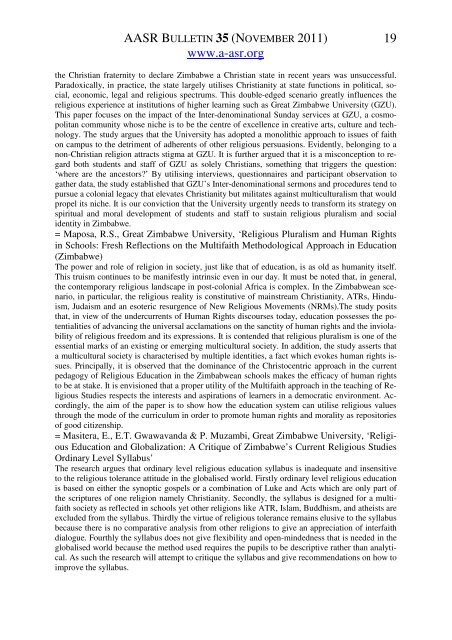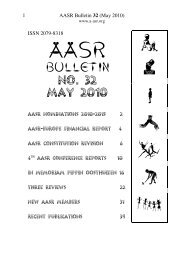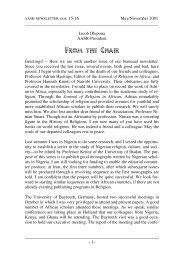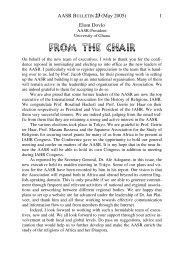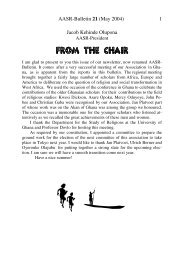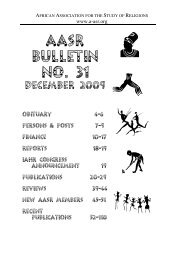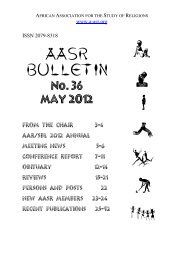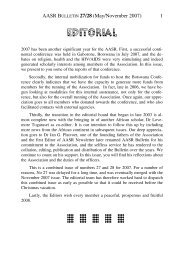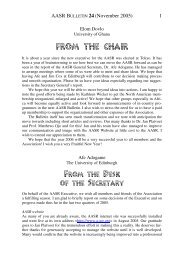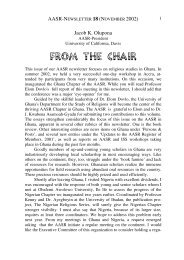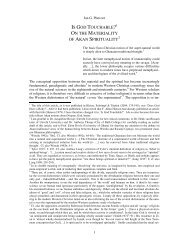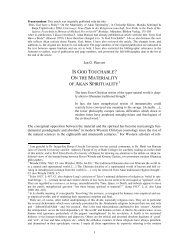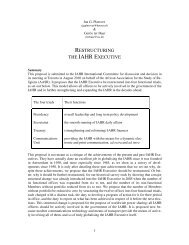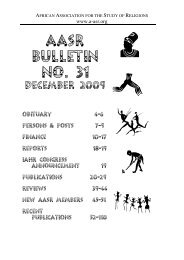AASR Bulletin 35 - The African Association for the Study of Religions
AASR Bulletin 35 - The African Association for the Study of Religions
AASR Bulletin 35 - The African Association for the Study of Religions
Create successful ePaper yourself
Turn your PDF publications into a flip-book with our unique Google optimized e-Paper software.
<strong>AASR</strong> BULLETIN <strong>35</strong> (NOVEMBER 2011)<br />
www.a-asr.org<br />
19<br />
<strong>the</strong> Christian fraternity to declare Zimbabwe a Christian state in recent years was unsuccessful.<br />
Paradoxically, in practice, <strong>the</strong> state largely utilises Christianity at state functions in political, social,<br />
economic, legal and religious spectrums. This double-edged scenario greatly influences <strong>the</strong><br />
religious experience at institutions <strong>of</strong> higher learning such as Great Zimbabwe University (GZU).<br />
This paper focuses on <strong>the</strong> impact <strong>of</strong> <strong>the</strong> Inter-denominational Sunday services at GZU, a cosmopolitan<br />
community whose niche is to be <strong>the</strong> centre <strong>of</strong> excellence in creative arts, culture and technology.<br />
<strong>The</strong> study argues that <strong>the</strong> University has adopted a monolithic approach to issues <strong>of</strong> faith<br />
on campus to <strong>the</strong> detriment <strong>of</strong> adherents <strong>of</strong> o<strong>the</strong>r religious persuasions. Evidently, belonging to a<br />
non-Christian religion attracts stigma at GZU. It is fur<strong>the</strong>r argued that it is a misconception to regard<br />
both students and staff <strong>of</strong> GZU as solely Christians, something that triggers <strong>the</strong> question:<br />
‘where are <strong>the</strong> ancestors’ By utilising interviews, questionnaires and participant observation to<br />
ga<strong>the</strong>r data, <strong>the</strong> study established that GZU’s Inter-denominational sermons and procedures tend to<br />
pursue a colonial legacy that elevates Christianity but militates against multiculturalism that would<br />
propel its niche. It is our conviction that <strong>the</strong> University urgently needs to trans<strong>for</strong>m its strategy on<br />
spiritual and moral development <strong>of</strong> students and staff to sustain religious pluralism and social<br />
identity in Zimbabwe.<br />
= Maposa, R.S., Great Zimbabwe University, ‘Religious Pluralism and Human Rights<br />
in Schools: Fresh Reflections on <strong>the</strong> Multifaith Methodological Approach in Education<br />
(Zimbabwe)<br />
<strong>The</strong> power and role <strong>of</strong> religion in society, just like that <strong>of</strong> education, is as old as humanity itself.<br />
This truism continues to be manifestly intrinsic even in our day. It must be noted that, in general,<br />
<strong>the</strong> contemporary religious landscape in post-colonial Africa is complex. In <strong>the</strong> Zimbabwean scenario,<br />
in particular, <strong>the</strong> religious reality is constitutive <strong>of</strong> mainstream Christianity, ATRs, Hinduism,<br />
Judaism and an esoteric resurgence <strong>of</strong> New Religious Movements (NRMs).<strong>The</strong> study posits<br />
that, in view <strong>of</strong> <strong>the</strong> undercurrents <strong>of</strong> Human Rights discourses today, education possesses <strong>the</strong> potentialities<br />
<strong>of</strong> advancing <strong>the</strong> universal acclamations on <strong>the</strong> sanctity <strong>of</strong> human rights and <strong>the</strong> inviolability<br />
<strong>of</strong> religious freedom and its expressions. It is contended that religious pluralism is one <strong>of</strong> <strong>the</strong><br />
essential marks <strong>of</strong> an existing or emerging multicultural society. In addition, <strong>the</strong> study asserts that<br />
a multicultural society is characterised by multiple identities, a fact which evokes human rights issues.<br />
Principally, it is observed that <strong>the</strong> dominance <strong>of</strong> <strong>the</strong> Christocentric approach in <strong>the</strong> current<br />
pedagogy <strong>of</strong> Religious Education in <strong>the</strong> Zimbabwean schools makes <strong>the</strong> efficacy <strong>of</strong> human rights<br />
to be at stake. It is envisioned that a proper utility <strong>of</strong> <strong>the</strong> Multifaith approach in <strong>the</strong> teaching <strong>of</strong> Religious<br />
Studies respects <strong>the</strong> interests and aspirations <strong>of</strong> learners in a democratic environment. Accordingly,<br />
<strong>the</strong> aim <strong>of</strong> <strong>the</strong> paper is to show how <strong>the</strong> education system can utilise religious values<br />
through <strong>the</strong> mode <strong>of</strong> <strong>the</strong> curriculum in order to promote human rights and morality as repositories<br />
<strong>of</strong> good citizenship.<br />
= Masitera, E., E.T. Gwawavanda & P. Muzambi, Great Zimbabwe University, ‘Religious<br />
Education and Globalization: A Critique <strong>of</strong> Zimbabwe’s Current Religious Studies<br />
Ordinary Level Syllabus’<br />
<strong>The</strong> research argues that ordinary level religious education syllabus is inadequate and insensitive<br />
to <strong>the</strong> religious tolerance attitude in <strong>the</strong> globalised world. Firstly ordinary level religious education<br />
is based on ei<strong>the</strong>r <strong>the</strong> synoptic gospels or a combination <strong>of</strong> Luke and Acts which are only part <strong>of</strong><br />
<strong>the</strong> scriptures <strong>of</strong> one religion namely Christianity. Secondly, <strong>the</strong> syllabus is designed <strong>for</strong> a multifaith<br />
society as reflected in schools yet o<strong>the</strong>r religions like ATR, Islam, Buddhism, and a<strong>the</strong>ists are<br />
excluded from <strong>the</strong> syllabus. Thirdly <strong>the</strong> virtue <strong>of</strong> religious tolerance remains elusive to <strong>the</strong> syllabus<br />
because <strong>the</strong>re is no comparative analysis from o<strong>the</strong>r religions to give an appreciation <strong>of</strong> interfaith<br />
dialogue. Fourthly <strong>the</strong> syllabus does not give flexibility and open-mindedness that is needed in <strong>the</strong><br />
globalised world because <strong>the</strong> method used requires <strong>the</strong> pupils to be descriptive ra<strong>the</strong>r than analytical.<br />
As such <strong>the</strong> research will attempt to critique <strong>the</strong> syllabus and give recommendations on how to<br />
improve <strong>the</strong> syllabus.


